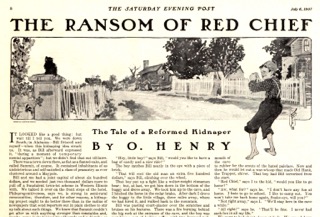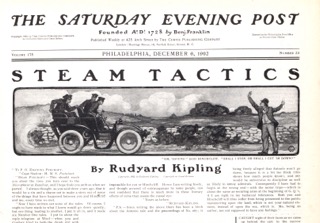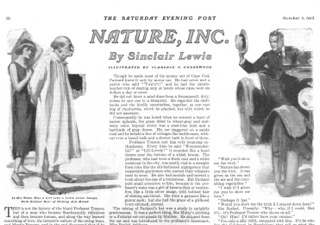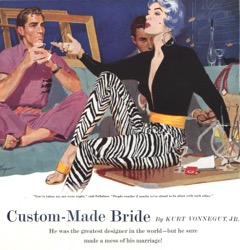A Century’s Search for Great American Authors

With the publication of the Best Short Stories of the Great American Fiction Contest 2016, featuring winner Celeste McMaster’s “Zelda, Burning”, the Post continues a century-long tradition of discovering new literary talent.
Ever since its earliest years, when it published works by Hawthorne, Irving, and Poe, the magazine was associated with great American fiction. But starting in 1899, it developed a reputation as the most prestigious magazine for writers to publish their stories in. Any struggling author whose story appeared in its pages, particularly in the 1920s and 1930s, could feel that he or she had arrived.

The man who built this reputation for the Post was George Horace Lorimer, an editor with a strong sense of what American readers wanted. In the 1900s, he paid top dollar for stories by the best authors of his time: Stephen Crane, O. Henry, and Joseph Conrad. And he turned down work by famous writers that he felt didn’t come up to the Post standards. He rejected 12 stories by Rudyard Kipling (who was living in America while writing The Jungle Book) before finding one he liked.
But Lorimer’s genius extended beyond recognizing quality from the big names in fiction. He purposely sought stories from promising unknowns. He scoured newspapers, looking for their work. He advertised in the Post, assuring writers that “good short stories bring good prices. The Post will pay well for cleverly written, unpublished stories from 3,000 to 5,000 words.”
Lorimer also regularly dug into the pile of unsolicited stories sent to the Post. Each year, the magazine received more than 175,000 manuscripts from authors hoping to hit the big time. Among Lorimer’s discoveries was a then-unknown author named Sinclair Lewis. In 1915, his “Nature, Inc.” — a satire about a pseudo-religious health farm — landed in the Post’s slush pile. Lorimer found the manuscript, read it, and immediately wrote to Sinclair: “‘Nature, Inc.’ is an exceedingly entertaining short story, and we are very glad to have it for The Saturday Evening Post. Now that you have made a start with us, I hope that you will … become a household word.”

Over the next five years, Lewis published 28 stories and articles in the Post. His last piece in the magazine was published five years after Lewis became the first American author to receive the Nobel Prize in literature.
Another Lorimer discovery was F. Scott Fitzgerald whose short stories were selected for publication before his first book, This Side of Paradise, hit bookstores. Years later, Fitzgerald recalled his excitement when he got the news the Post had accepted his work: “I’d like to get a thrill like that again, but I suppose it’s only once in a lifetime.”
In the 1950s, the Post published several stories written by a young publicist at General Electric named Kurt Vonnegut. Of the 11 stories that appeared in the Post, most were written before Vonnegut developed his signature style. But if you read his seventh story, “Miss Temptation,” you’ll definitely recognize notes of his distinctive literary voice.
The Post also played a role in boosting the career of Ray Bradbury. When the Post published “The World the Children Made” in 1950, it was the first time Bradbury’s fantasy writing appeared in anything other than a pulp magazine. The Post published 16 of Bradbury’s stories over the next 62 years, the last appearing in 2012.

In the 1940s, a Jerome David Salinger submitted several stories to the Post. By the time his first story appeared in the magazine, Salinger had been drafted, sent overseas, and participated in the D-Day invasion. He was thrilled to hear that “The Varioni Brothers” would appear in the Post. “My God,” he wrote one of his old writing teachers, “the millions of people who’ll read them. Can you imagine?”
Shortly after his fifth story appeared in the Post — “The Last Day of the Last Furlough”— he was among the first American troops to enter liberated Paris. When he bumped into Ernest Hemingway, then serving as a war correspondent, Salinger hunted up a copy of the Post and took it to Hemingway, asking him for his opinion. After reading the story, Hemingway declared Salinger “a helluva talent.”
The name Ernest Hemingway reminds us that the Post didn’t publish every great American writer of the 20th century. We might have published Jack London, Edith Wharton, William Faulkner, John Steinbeck, Truman Capote, Thomas Pynchon, Zora Neale Hurston, Carson McCullers, Pearl Buck, James M. Cain, Shirley Jackson, Tom Wolfe, John Cheever, and John Updike — but we never published any Hemingway.
Though we can’t be certain that he ever submitted anything to the Post.
Don’t miss your chance to join this group of great American authors. Make sure the Post receives your entry to the Great American Fiction Contest before the July 1, 2016, deadline.